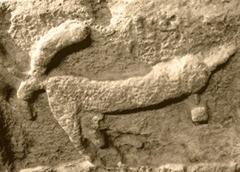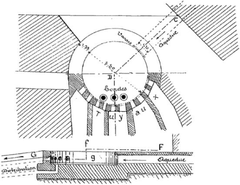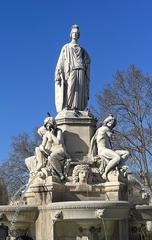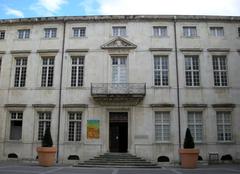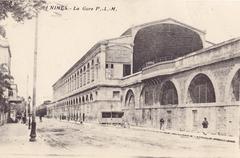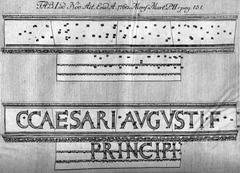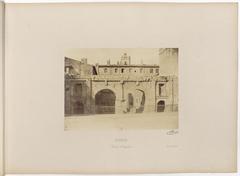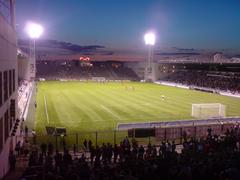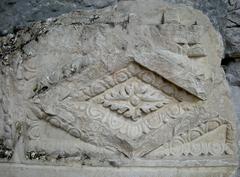
Stade Jean-Bouin Nîmes: Visiting Hours, Tickets, and Travel Guide
Date: 04/07/2025
Introduction
Stade Jean-Bouin, located in the vibrant city of Nîmes, France, is a living testament to the region’s rich sporting tradition and enduring community spirit. Established in 1919, it has been a cornerstone of local football, a symbol of social unity, and today, a revitalized hub for amateur sports and community life. Whether you are a football aficionado, history enthusiast, or a traveler exploring the Roman wonders of Nîmes, this guide presents a detailed overview of the stadium’s legacy, practical visiting information, and its integration into the broader cultural landscape of the city (Objectif Gard; Wikipedia; planetenimesolympique.fr; Vivre Nîmes).
Table of Contents
- History and Significance
- Architectural Evolution and Design
- Current Facilities and Community Role
- Practical Visitor Information
- Nearby Attractions and Cultural Experiences
- Frequently Asked Questions (FAQ)
- Summary and Call to Action
- References and Useful Links
History and Significance
Foundations and Early Development (1919–1937)
Originally established as Parc des Sports du Jeu-de-Mail, the stadium began its journey when the Sporting Club Nîmois acquired land on Rue du Jeu-de-Mail in 1919. Modest at first—with tennis courts, a cedar tree, and basic amenities—it quickly grew in stature, reflecting the city’s burgeoning enthusiasm for football (Objectif Gard; Wikipedia).
Inauguration and Naming (1931–1937)
On October 18, 1931, the stadium was officially inaugurated as Stade Jean-Bouin, named after the celebrated French athlete and World War I casualty. This act of commemoration echoed across France, reinforcing the site’s symbolic significance. New stands and expanded facilities followed, solidifying its status as a centerpiece for local football (Planète Nîmes Olympique).
Nîmes Olympique Era and Golden Age (1937–1989)
The birth of Nîmes Olympique in 1937 ushered in the stadium’s golden era. As the home of the “Crocos,” it hosted legendary matches, European competitions, and became renowned for its intimidating, electric atmosphere, thanks to passionate supporters and the imposing “montagne humaine.” Despite periodic challenges—wartime requisition, bomb damage, and structural incidents—the stadium was continually upgraded, including a new concrete main stand (1958) and floodlights (1962) (Wikipedia; Editions Atelier Baie).
Decline, Replacement, and Renewal (1989–Present)
With the opening of Stade des Costières in 1989 and the demolition of the original Jean-Bouin in 1997, the site shifted focus to amateur sports and community activities. A major renovation in 2023–2024 transformed the complex into a modern, multi-use facility, reaffirming its role as a vibrant community hub (Vivre Nîmes).
Architectural Evolution and Design
Early Construction and Expansion
- Origins: Initially a simple field with basic wooden stands, evolving over decades to include a main stand, press tribune, and defined pitch dimensions (RouteYou).
- Named Features: The stadium and adjacent Rue Jean-Bouin pay homage to the French athlete, reflecting its status as a local landmark.
Golden Era Modifications
- Capacity: Expanded to host 15,000 spectators at its peak.
- Atmosphere: The compact design and proximity of stands to the pitch created an intimate, raucous matchday experience.
Modernization (2023–2024)
- Synthetic Turf: Installation of a cutting-edge playing surface.
- Facility Upgrades: Restoration of substructure, improved lighting, accessible pathways, and upgraded changing rooms.
- Community Focus: Designed for intensive use by local clubs, schools, and associations, making the stadium inclusive and adaptable (Vivre Nîmes).
Current Facilities and Community Role
Stade Jean-Bouin is now a modern, well-maintained sports complex, predominantly serving amateur football clubs (notably the JSCBA), educational institutions, and local associations. The stadium is utilized for over 85 hours weekly, illustrating its centrality to community life (Vivre Nîmes).
Visitors will find:
- Synthetic pitch: For year-round use.
- Accessible facilities: For individuals with disabilities.
- Modern changing rooms and lighting.
- Multi-sport capability: While football is primary, the site also supports other sports and community events.
Practical Visitor Information
Visiting Hours
- Monday to Friday: 9:00 AM – 8:00 PM
- Saturday: 10:00 AM – 6:00 PM
- Sunday: Closed (open for special events or matches)
- Note: Hours may vary during public holidays or special events. Always verify with the official Nîmes tourism office before visiting.
Tickets and Entry
- Casual Visits: Free for public access during non-event times.
- Events/Matches: Tickets are available on-site or online via club websites (e.g., JSCBA) and the official ticketing platform.
- Guided Tours: Offered occasionally by local sports clubs or historical societies. Inquire with the Nîmes tourist office.
Accessibility
- Facilities: Wheelchair-accessible paths, seating, and restrooms.
- Assistance: Contact stadium management in advance for specific needs.
Location and Transport
- Address: Rue Jean-Bouin, northeast Nîmes (RouteYou)
- Public Transport: Well-served by city bus routes; approximately 10 minutes’ walk from the city center.
- Parking: Available nearby.
Facilities and Services
- Restrooms, changing rooms, and food kiosks (during events).
- Information desks and first aid during major events.
- Complimentary Wi-Fi in select areas.
Nearby Attractions and Cultural Experiences
Stade Jean-Bouin is conveniently located near Nîmes’ most famous Roman landmarks and cultural sites, making it an ideal starting point for a broader exploration of the city:
- Les Arènes de Nîmes: Iconic Roman amphitheatre hosting concerts and festivals (The Crazy Tourist).
- Maison Carrée: Exquisitely preserved Roman temple.
- Jardins de la Fontaine: Historic gardens perfect for strolling.
- Pont du Gard: UNESCO-listed Roman aqueduct, ideal for day trips (The Crazy Tourist).
Cultural Tips:
- Sample local cuisine at Les Halles de Nîmes or nearby bistros.
- Try regional specialties like brandade, gardiane de taureau, and tapenade.
- Utilize the Nîmes City Pass for discounted attraction access and public transport.
Frequently Asked Questions (FAQ)
Q: Can I visit the original Stade Jean-Bouin?
A: The original stadium was demolished, but the site remains open as a modern community sports complex.
Q: How do I buy tickets for events?
A: Purchase online at billetterie.stade.fr, through club websites, or at the stadium on event days.
Q: Is the stadium accessible for visitors with disabilities?
A: Yes, recent renovations ensure inclusive access and facilities.
Q: Are guided tours available?
A: Guided tours are offered occasionally; check with the Nîmes tourist office for current options.
Q: What else can I see nearby?
A: Don’t miss the Arena of Nîmes, Maison Carrée, Jardins de la Fontaine, and Pont du Gard.
Summary and Call to Action
Stade Jean-Bouin is more than just a sports venue—it’s a living part of Nîmes’ identity, blending a storied past with a vibrant present. Visitors can experience its unique atmosphere, modern amenities, and proximity to some of France’s most remarkable Roman sites.
Plan your visit:
- Check official schedules and ticketing.
- Explore Nîmes tourism resources.
- Download the Audiala app for updates, events, and exclusive content.
Whether attending a local match, exploring the stadium’s grounds, or soaking in the city’s Roman heritage, Stade Jean-Bouin promises a memorable and authentic Nîmes experience.
References and Useful Links
- This is a sample text. (Objectif Gard)
- This is a sample text. (Wikipedia)
- This is a sample text. (planetenimesolympique.fr)
- This is a sample text. (Vivre Nîmes)
- This is a sample text. (The Crazy Tourist)
- This is a sample text. (Nîmes Tourisme)
- This is a sample text. (Nîmes Olympique)
- This is a sample text. (billetterie.stade.fr)

